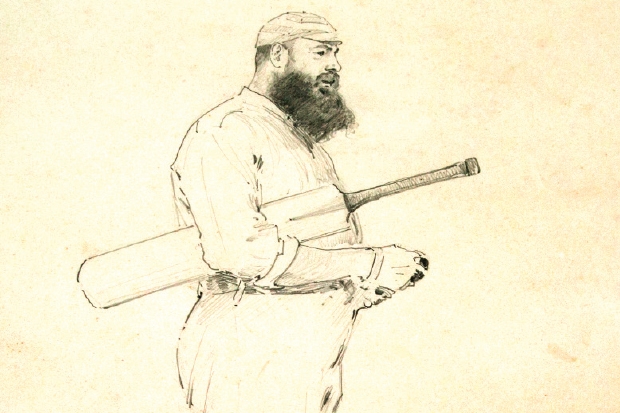Should you wish to have a good copy of the 1916 edition of Wisden, cricket’s annual bible, you should be prepared to part with at least £5,000 and, quite possibly, much more than that. This reflects its rarity — the Great War ensured that the almanac had a limited print run — but also the significance of its contents. For the 1916 edition carries the obituaries of Victor Trumper, the wondrous Australian nonpareil and of course, the greatest Champion of them all: W.G. Grace.
The summer game had never seen anything like Grace before and never will again. Other cricketers have scored more runs and taken more wickets than Grace but none did so in more pressing circumstances. The pitches Grace played on in his prime were wicked creatures upon which, most of the time, even the greatest batsmen could never feel in total control. It was a time when batsmen at Lord’s routinely found themselves picking stones out of the wicket. To put it another way, as Richard Tomlinson notes in his new biography, it is very much easier to imagine Grace thriving in modern conditions than it is to imagine current players coping with the kind of cricket Grace dominated.
Only Don Bradman rivals him. The Don’s test average of 99.94 makes Grace’s career average of 39 seem unfussworthy. Yet the manner in which Grace dominated his contemporaries was, well, Bradmanesque. In the 1871 English season, for instance, 17 centuries were scored in first-class matches; Grace accounted for ten of them, averaging 78 for the season. No one else averaged more than 40.
Grace, as David Frith has observed, took batting ‘from its middle ages of development into something that moderns will instantly recognise’. His instinct was to attack wherever possible, and his dominance was such that Tom Emmett, the great Yorkshire fast bowler, complained that ‘he ought to be made to play with a littler bat’. With this came a famous gamesmanship and an attitude to expenses that we might now deem to be of parliamentary scale.
1895, by which time he was 47, proved his Indian summer. First came his hundredth first-class century, then he became the first man to score 1,000 runs by the end of May. Wisden, then coming into its own itself, declared him the cricketer of the year. A subscription fund keenly promoted by the Daily Telegraph raised, in modern terms, more than £1 million for the Champion. Lord Salisbury, leader of the Tory party, contributed £5; not to be outdone, Lord Rosebery, the Liberal prime minister, chipped in £25. No wonder Tomlinson considers Grace ‘the first truly modern international sports star’. The Doctor was not merely famous, he was, in the modern sense, a celebrity too.
Tomlinson, who has a snappy impatience with many of Grace’s previous biographers, rejects the notion Grace was a simple yokel. On the contrary, his approach to batting was quasi-scientific and the Doctor was more intelligent than he seemed. Nevertheless, Tomlinson over-reaches at times. Thus W.G.’s gluttony was ‘perhaps a self-defeating attempt to cope with increasing competitive pressure’ or he ‘may also have been seeking release from private sorrows as he grew older’. Or, possibly, he simply enjoyed eating.
The difficulty with Grace, as with Bradman, comes in explaining just why he was so much better than all his contemporaries. One might as well seek an explanation for Shakespeare or Mozart. Sometimes things just are as they are, resisting any explanation.
Charlie Connelly’s novella, a picaresque tour of the Champion’s final years, does its best to conquer this obstacle but, like Tomlinson, proves unequal to the task. Asked by a journalist how it felt to bring up his hundredth hundred, Grace offers nothing but a dead bat: ‘I knew it was hit well enough that I wouldn’t need to run.’
Connelly’s imagination is warm, however, and his book is a charming curiosity. A melancholy one, too, as Grace grapples with the death, from typhoid, of his beloved daughter Bessie and recalls, too, the passing of his own brother Fred. Old age is a shipwreck and the Doctor was marooned too. He died raging, like Lear with a bat, against the terror of German zeppelin raids on London.
And with him passed an era. In this, the centenary of his death, Grace seems as unique and unfathomable as ever. C.L.R. James, the great Trinidadian writer and cultural critic, still put it best: Grace was a ‘pre-eminent Victorian’. Through him, ‘cricket, the most complete expression of popular life in pre-industrial England, was incorporated into the life of the nation. As far as any social activity can be the work of any one man, he did it.’ The Champion built it and we still play it.







Comments